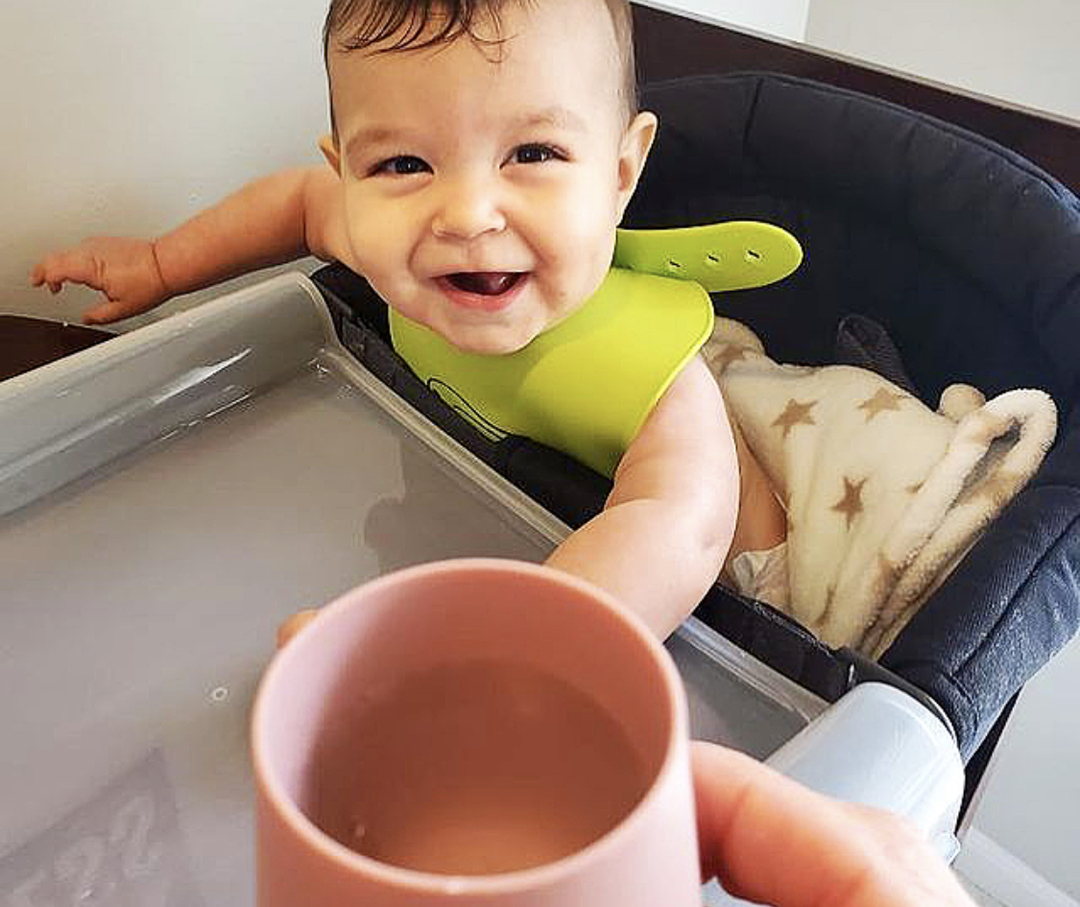When Can My Baby Drink Water?

As a pediatric feeding specialist, I teach families across the globe. And no matter what country the parent is from, one of the biggest concerns I hear about is water consumption for their baby. Here are some common water questions I get asked, plus how I respond as a swallowing expert.
Can I use water when teaching open cup drinking to my 4- to 6-month-old baby?
Babies under six months should not drink water due to the risk of “water intoxication” (the kidneys are too immature to filter water). Developmentally, we begin teaching open-cup drinking between 4-6 months of age. During this stage of development, babies should learn to drink from an open cup (held by an adult) filled with breast milk or formula – not water.
Can I give my baby water to help with hydration?
Breastfed babies do not require additional water because breastmilk is 80% water, meeting their hydration needs. Likewise, no extra water is needed for formula-fed babies since formula is chemically designed to maintain their hydration needs. In addition to breast milk/formula, I like to offer babies (six months or older) first foods naturally high in hydration. Some of my favorites are overripe watermelon, cantaloupe, peaches, and strawberry spears (or purees in an open cup).
Should I stop breastfeeding and replace breast milk with water when I start baby-led weaning?
Although the name is similar (and it can be confusing), weaning your baby from a breast or bottle is different from baby-led weaning (BLW). BLW is a feeding method for introducing your baby to solid food, and it starts around 6 months of age. Weaning from a breast occurs when you (and your baby) choose to make that transition. The preferred liquid the American Academy of Pediatrics (“AAP”) recommends for the first 6 months of life is breast milk (or formula), not water. After 6 months, the AAP continues to recommend breast milk and formula as well as solid foods for both baby’s nutritional and hydration needs. In addition, they state that parents can choose to offer 4-8 oz of water a day for ages 6-12 months. Please keep in mind that drinking water this early is not a swallowing or drinking milestone. It is an additional liquid caregivers can consider offering to their baby. As an infant swallowing therapist, I prefer to wait to offer water to the baby until 9 months of age. (Keep reading to learn why.)
Can water affect my baby’s hunger and fullness cues?
Yes, water can make a baby feel full and interrupt their hunger and fullness cues. This can, in turn, affect their consumption of solids and start food refusals. Suppose you want to offer a developmentally appropriate liquid before (or during) a meal to help with swallowing, clear your baby’s mouth of pocketed food, or help satiate their appetite. In that case, breast milk or formula is best.
When should we safely introduce water?
I like to introduce water from an open cup around 9 months. By this age, their kidneys are fully developed, and they have had success drinking thicker liquids from an open cup (e.g., breast milk, formula, fresh smoothies, and thin or thick purees). This practice with thick (and slower) liquids improves their ability to maintain a safe head and neck posture for drinking a thinner (and faster) liquid like water. Additionally, if water is introduced too early (and the liquid ‘goes down the wrong way’), babies may refuse to drink from a cup, which can lead to nutritional or developmental delays.
Should my older baby learn to like the taste of water?
Yes. Developmentally, babies can be introduced to a straw cup with thick liquids around nine months of age. With time and practice, they can quickly graduate to thin liquids like water (between nine and twelve months of age). This is an excellent time to introduce the “taste” of water, and you can do so from an open cup or a straw cup. Just remember; even a few hesitant sips are a great start when introducing water! This is part of helping babies become toddlers that enjoy drinking water and can do so safely.
Getting your baby to be safe and successful with drinking water takes patience. But practicing open cup and straw cup drinking with breast milk (or formula) can prepare your baby to take this next step in their swallowing development.
P.S You can get the safe open cup and straw cups I designed for ezpz with the Developmental Cup Set, which saves you $7 when buying the set and you can use the code: BABY10 for an additional 10% off at checkout.





